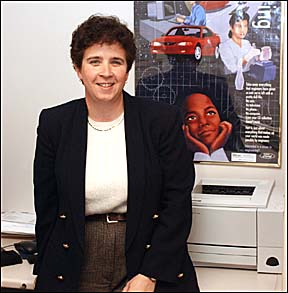|
|
|
|
|
|
INSIDE IOWA STATE May 24, 2002 Smoothing the way for others
As an Iowa State engineering major 20 years ago, Karen Zunkel was one of the guys. Accustomed to being among few other women in her classes, this "professor's kid" formed a study group with three male engineering majors that lasted throughout their four years on campus. The fledgling Society for Women Engineers chapter held little interest for Zunkel, who grew up in Ames, was active in her sorority and who viewed herself as "an engineer, not a woman engineer." "I was either very nave or very confident," Zunkel says now of her undergraduate days. "I'd played sports with boys all my life, so I never felt discouraged or discriminated against in college." Add to that a nearly lifelong association with the ISU campus (Zunkel's father, Charlie Martinson, is a retired associate professor of plant pathology, and her mother, Kathryn Martinson, retired from the ISU Foundation as an account clerk), and Zunkel's path toward her bachelor's degree was remarkably free of roadblocks. Paving that same smooth path for other girls and young women is Zunkel's charge as the new director for Iowa State's Program for Women in Science and Engineering (PWSE). She replaces Mary Ann Evans, who created the program in 1986, and who retired last year. (Evans continues to direct the program's international component.) Immersed in the engineering world since her 1983 ISU graduation, Zunkel is well versed in the challenges that face her. "Nationally, the percentage of young women enrolled in engineering and science majors has reached a plateau of about 15 percent of admitted students," Zunkel explained, "and that percentage has remained stagnant for quite some time. If we're going to continue to meet industry demand in those areas, we need more women." Zunkel began her own professional odyssey with AT&T Technologies, first as a product engineer in Oklahoma City and then as a systems consultant in Des Moines. Concurrently, she earned a master's degree from the University of Oklahoma and relocated to central Iowa so her husband, Gary (now a program coordinator for the ISU Research Foundation), could return to his family's farming operation. By 1990, the Zunkels had two young sons, and Karen was looking for a professional change. She signed on as a part-time, temporary instructor in freshman engineering, thus beginning an 11-year stint in the College of Engineering. Her tenure there might best be described as "eclectic." For the first five years, her responsibilities ranged from creating the "Not All Engineers Drive Trains" curriculum, to teaching ICN graduate courses to Rockwell engineers, to coordinating a women's program for the college. In 1996, Zunkel became manager of engineering student services (now known as engineering undergraduate programs). In that position, she oversaw the college's orientation program, scholarships, outreach and recruitment and various academic management assignments. So why the change? "This position gives me the opportunity to pursue these programs at the university level," Zunkel explained. "I want to help the university partner better. We all set up our little kingdoms and we do great things. But we're not taking advantage of what the others on campus are doing, and consequently we aren't always as efficient as we could be." The PWSE program reaches out to girls and young women from elementary ages through their university experience. Conferences like "Taking The Road Less Traveled" expose young girls to career options in science, engineering and technology. Residence hall programs and learning communities on campus group together women with similar academic and career interests for classroom and living opportunities. Summer internships pair female students with university professors to collaborate on research projects. Mentoring programs and scholarships round out the institutional support to these women. Zunkel now finds herself in a review process of these programs and services as PWSE moves toward its third decade of existence. "Now's the time to ask if we're still doing the right things," she said. "I'm an industrial engineer, and I focus on the cost benefits. I think it may be time to become more business-focused, to understand better what industry wants and how we can meet those needs. "And we have to recognize that the professions have changed --I took programming on punch cards," she noted. "Aside from the technological changes, employers are doing a better job at recognizing employees as whole persons, and are becoming more accommodating and more flexible. This is a real plus for women in those professions. We just have to learn to sell it that way." Zunkel, who is completing an ISU doctorate in educational leadership and policy studies, sees intensified outreach efforts as her main strategy in moving beyond the admissions plateau. "Initially, we need to capitalize on our strength as a central university program," she said. "Then we can better serve these women as we partner with individual departments and colleges. The neat thing is that PWSE has name recognition across this state. Now's the time to make it even better and eventually see another increase of women coming in to our programs." Is there the possibility Zunkel will do such a good job she'll make her own program obsolete? "I don't see those numbers growing that high in my career lifetime," she responded. "Every major university has a program like this. The gap continues to widen between industry needs and numbers of graduates. And at some level, we need more programming for underrepresented students. There's a lot of work to be done." |
|
Ames, Iowa 50011, (515) 294-4111 Published by: University Relations, online@iastate.edu Copyright © 1995-2001, Iowa State University. All rights reserved. |
